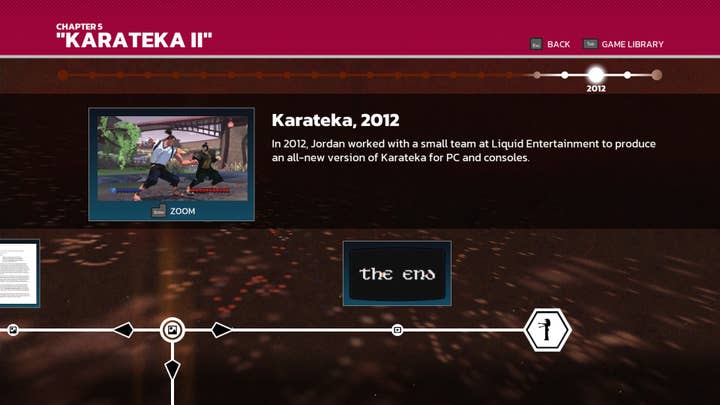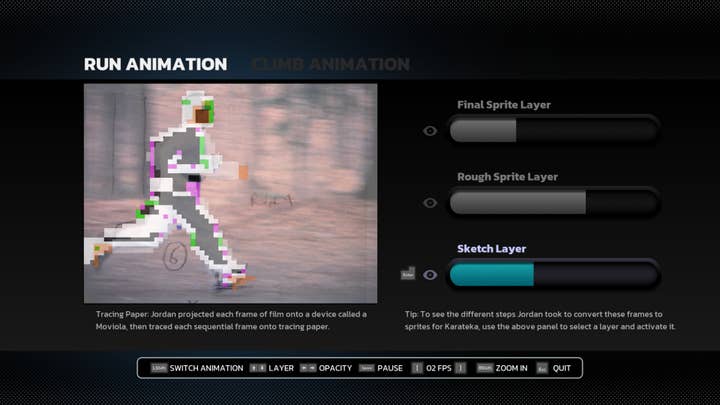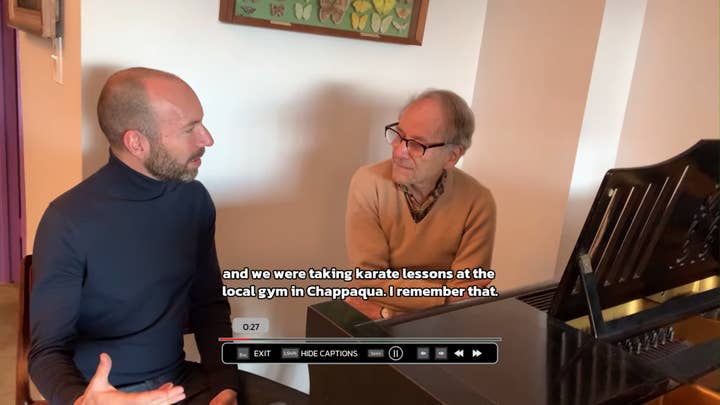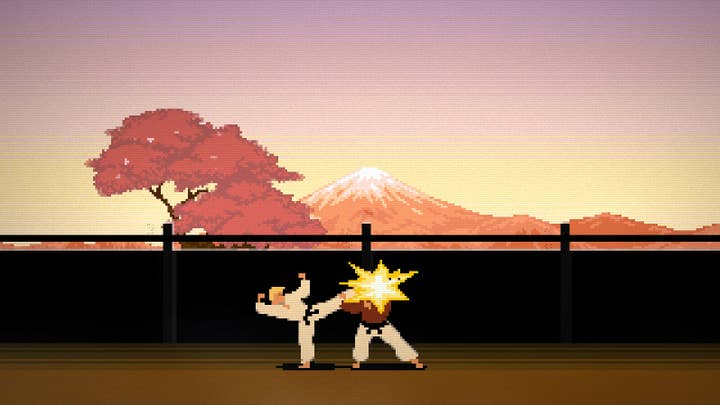Is Digital Eclipse’s Gold Masters Series the future of video game documentaries?
Chris Kohler tells us about the recently launched The Making of Karateka and how it tackles the history of games
Sign up for the GI Daily here to get the biggest news straight to your inbox
On August 29, Digital Eclipse launched the Gold Masters Series, which aims to explore the history of video games through the interactive documentary format.
The first release, The Making of Karateka, feels like the culmination of what the American studio has done in the past decade, integrating many features that had a 'trial run' in previous productions like Teenage Mutant Ninja Turtles: The Cowabunga Collection and Atari 50: The Anniversary Celebration. Which makes sense, considering it took quite some time to go from the initial idea to the actual realization of it.
"When I arrived at the company in 2020," editorial director Chris Kohler told us, "Karateka had been signed and the concept of the Gold Masters Series was already there. But the concept kind of goes back to the relaunch of the Digital Eclipse brand back in 2015."
"Karateka is the prototype of Prince of Persia. It's a very important game and it's a story we that really wanted to tell"
According to Kohler, the idea was to pick out landmark games, series, studios or even just stories about games and then "do essentially independently produced versions of the work Digital Eclipse was already doing." The independent nature of the project is very significant, because it gives more freedom to a studio that is used to dealing with big publishers and their constraints.
"So many of the Digital Eclipse projects start when a publisher comes to us, because they want to do a certain game collection," Kohler explains. "Or sometimes we go to publishers and pitch ideas."
In this case, however, the studio wanted to flip the script, license the game and do exactly what they wanted to do.
1984 martial arts game Karateka, developed by Prince of Persia creator Jordan Mechner, was the perfect starting point - and not just because of its importance in video game history. There’s the incredible abundance of available materials, thanks to Mechner having kept or found so many diaries, documents and even source code from the 1980s, which really allowed Digital Eclipse to lay everything out with dates and context, giving life to a gripping narrative. Plus, Mechner owned the rights to the game.
"Very smartly, when he originally did the contract with Broderbund, his father Francis Mechner told him to license the game to the publisher for ten years," Kohler says. "Ten years in 1984 was basically forever for a video game. So the rights reverted back to Jordan."

And being able to negotiate directly with Jordan Mechner was quite useful for an indie developer working on a self-funded project with a limited budget.
"It really hit the sweet spot as far as something that we could feasibly do. Karateka had not really been brought back in any significant way since 1984 and it is sort of the prototype of what [Mechner] would then do with Prince of Persia. It's a very important game and it's a story that we really wanted to tell."
The publishers’ lax attitude towards preservation and rights management was useful in this case but it can be a problem. "Video games are considered even now to be disposable," Kohler told us. "I think we're changing minds on that. But it's very unusual for somebody to document what they did and the way that they did it. There are other games that have that level of documentation, though. So it's just a matter of, can we can we get our hands on them?"
The availability of historical materials is a huge factor in deciding the subject of future Gold Masters Series releases, but as Kohler reiterated, this project is absolutely not only focused on exploring the development of single games.
"The story that we're telling will sort of lead us to what is the next title or what is the focus of the whole thing. Is it a game, a series of games, a franchise, a person or even... is it a story? What if we were able to license multiple games from multiple franchises and publishers, and use those to tell the story of the evolution of a genre?"
That would be a much more complex proposition in terms of budget and project management, but Kohler says the format allows this: "If you're just doing a retro collection, you have to look for super hot games that are playable today, that everybody already knows about. But as far as an interactive documentary goes, we could license and publish a game that nobody's ever played, that was developed and maybe canceled. At least if it has a really interesting story that we can tell."

Scheduling and budget also define the ambition of the project; Karateka is arguably the grandfather of the cinematic platformer but the documentary doesn’t delve too deep into its contemporary legacy. Asked about this, Kohler said that Digital Eclipse could have spoken about this in much more detail, but it would require securing the rights to show later games that were influenced by Karateka, as well as tracking down more developers for interviews. Ultimately, this wasn't possible but it's something he says could be done on future Gold Masters Series title.
Interestingly, The Making of Karateka is based on a 'timeline' structure, with a narrative that guides the user through all the included materials.
"Video games are considered even now to be disposable. I think we're changing minds on that"
"I think it does this material a disservice if you just sort of take it all and drop it into a bucket," Kohler told us. "We don't see this as bonus material. We see this as part of the story that we want to tell and part of how we do it. If a museum has an exhibit about Alice in Wonderland, they don't just drop all of the materials in a pile on the floor. Curators look at everything in their collection and extract certain things they can use to tell a story."
The big difference with a museum exhibit is that the Gold Masters Series can actually make the whole 'collection' available to the general public. The horizontal timeline presents the curated materials in a chronological, narrated order, but the vertical timeline allows you to go deeper and parse through additional documentation.
"We want this to be both a curated museum and an archive of everything we get our hands on," says Kohler. "So that if you do want to do that digging, you can, and that's what the video game format allows us to do. And then, if you want to go even further than that, we can have photo galleries within those timelines so you can dig deeper."
All of that means the user can just parse the narrative part of the documentary or spend as much time as they want looking at every single piece of documentation. "I can't imagine another way of doing that than to do it through the video game format," Kohler adds.
And then there’s the actual playable part. The Making of Karateka includes prototypes of the titular game in various stages of development, plus the final version on the Apple II, Commodore 64 and Atari 8-bit formats. The 2012 Karateka remake is barely mentioned. "It's not part of the story that we're telling," Kohler told us.
Digital Eclipse also included development prototypes of the two previously unreleased Jordan Mechner games: Asteroid Blaster and Deathbounce. All of these games are authentically emulated, with many added features, including the option to watch a playthrough, stop it at any time and take control of the action.
"It's an emulation solution with all the features integrated. The Eclipse Engine is custom built for this purpose, to ingest audio, video, and emulators that we do in-house or we license."
The engine is quite versatile, as Kohler describes it: "We can do things like you saw on Atari 50: The Anniversary Celebration with Yar's Revenge, where you've literally got the 2600 version of Yar's Revenge running. We're running the 2600 code as it is with all of the original behaviors. And then we put that layer of new graphics on, and we can add features, while still keep the original code as the core."

The Making of Karateka also includes a modern remake of Deathbounce, which happens to be the first commercially available version of that game, and a remake of Karateka.
"We wanted people to understand that in Deathbounce, there is the kernel of a great idea. And maybe it actually would have been successful had Broderbund published it in 1983. We don't know. But we wanted to do a new version to take that core gameplay, update it and show why there was something really good there."
The Karateka remake, apart from giving players a more modern and immediately playable version of the classic, was also an opportunity to include content that was cut from the original game, like the panther that is visible in the documentary.
"We want this to be both a curated museum and an archive of everything we get our hands on"
The versatility of Digital Eclipse's engine is also part of the reason why every single entry of the Gold Master Series could be quite different from the others.
"The games don't have to be popular or good," Kohler says. "As long as there's a really good story that we can tell around it, I actually think that we can make it compelling for people to experience games that otherwise, you know, they might have passed on or never experienced before.
"But the next one will have good games in it. I promise."
This format could also be a good way to show people what actually happens behind the curtain of game development, something that the industry has rarely done effectively.
"I hope so," Kohler agrees. "With the Karateka story, anecdotes from 1984 are very similar to stuff that still happens in games today, even though of course with a higher level of technology. It’s the same people, it's the same arguments. The back and forth between Jordan having created the game and the publisher, the pitch process and everything else… the industry was in its infancy and it's on a smaller scale, but fundamentally, a lot of the conflicts are the same.
"So I do hope that it would kind of open people's eyes to a lot of the trade-offs, the negotiations, the compromises and the things that have to happen behind the scenes of video games development. I mean, fundamentally, it's an entertainment product, but if it can help to aid people's understanding of the behind the scenes of making video games, I think that would be amazing as well."

The second release in the series is "already locked" and should be out before the end of 2023. That’s a quick turnaround, but fans should not expect to see a new Gold Masters Series release every couple of months.
"It is because one and two were being worked on simultaneously in many respects," Kohler explains. "We did love the idea of being able to actually have a series out there, with two titles."
And, Kohler assures us, it will be a significantly different product from The Making of Karateka: "The balance of certain types of content will be different. If you imagine sort of what percent is design documents, what percent is games, stuff like that. But fundamentally it is about telling a really interesting story from gaming history."
Meanwhile, looking to the future, how successful does this series need to be for it to be viable in the long run?
"It doesn't have to be as successful as other much bigger Digital Eclipse projects has been, but certainly we do need to hit some level of financial success. So please, you know, buy ten copies."
Sign up for the GI Daily here to get the biggest news straight to your inbox

